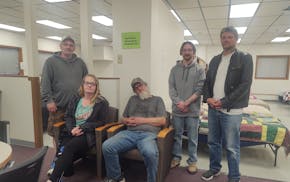GRAND RAPIDS, MINN. – Teresa Kittridge is so invested in encouraging rural women to run for office that she doesn't care what party they come from.
"We are all about better supporting each other as women," Kittridge said. "Of course we don't agree on everything, but we all need to learn how to be there for each other and inspire each other to lead."
Kittridge, of Marcell, Minn., an unincorporated area 29 miles north of Grand Rapids, lives in a part of the state that has flipped in recent elections from blue to red. But what matters most to her is connecting women of all ideologies through the organization she founded, 100 Rural Women.
Running for office isn't the only thing her organization focuses on. It's a networking system designed to encourage women in leadership in community and business roles as well. But it's election season, and many of the women she works with want to see more women running, or want to run for office themselves.
Candidates her organization has worked with include Amy Johnson, who was elected mayor of Ashby, a city of 475 between Alexandria and Fergus Falls, and Juleigh Prosser, who is running for Clearwater County Board in northwestern Minnesota.
Darcy McKenzie, a liberal activist from the Twin Cities who grew up as a Republican in North Dakota, has mentored Prosser and says she's not even sure what Prosser's politics are. Even if she hailed from the MAGA wing of the Republican Party, that would be OK with McKenzie.
Prosser has good ideas about land and water use in her county, McKenzie said, and her view is that what people want to accomplish in their counties matters more than their chosen political label.
In fact, McKenzie said she would be willing to mentor members of the conservative Moms for Liberty group — with limits. She disagrees with their positions on LGBTQ issues and banning library books, so she probably wouldn't support the group's members in school board races. But she could see herself helping in a run for City Council.
"Does she have the time? Does she have the wits? Does she get involved?" McKenzie said. "The Moms for Liberty, they do have the passion, so they're good workers. They can get the job done. Yeah. I would work with them in a second if they wanted to be a public servant."
In greater Minnesota, there's a great need to see beyond politics. There's a shortage of candidates for all sorts of local offices in greater Minnesota, from township boards, school boards, city councils, county boards, as well as library boards, hospital boards, boards of adjustment, planning and zoning boards, and more. During the last election, the city of Millerville in Douglas County couldn't get anybody to run for mayor. The City Council had to appoint someone.
Women make up half the population but tend to hold a much smaller proportion of local offices than men. It's a natural group to tap to fill these positions.
Fewer than one in five county board seats in Minnesota are held by women, said Sheila Kiscaden, Olmsted County commissioner and a former state legislator.
"Women frequently have to be asked many times before they run," she said. "And if you're the only woman out in your rural county running for office, it's different to run as a woman than as a guy because we still have some assumptions about women's roles and men's roles."
Kiscaden also mentored Prosser, a former business owner who moved to Clearwater County less than a decade ago, and where only one woman has ever served on the county board, as far as Prosser knows. Women tend to broaden the scope of county commissions, said Kiscaden — introducing concerns about children and the elderly, for instance.
Local offices are nonpartisan. What that means is you don't have a political party to back you. It can feel like you're on your own.
Prosser's mentors helped her learn everything from what a county commissioner does to how to choose campaign colors (she went with red, white and blue, but it had to be a certain red and a particular blue). She learned to lean into what might be a negative — that she's a woman, and that she's not native to Clearwater County — to explain how that would be useful to the county commission. She would bring new ideas: among them, working on a way for local farmers to process what they grow locally.
It can be intimidating for anybody to put their name out there. Prosser pushed through the discomfort. She came in second in the August primary, and will run in the general election in November.
Karen Tolkkinen is a columnist for the Star Tribune, writing about the people and issues of greater Minnesota.

Tolkkinen: Brainerd City Council tells homeless to sleep outside this summer

Tolkkinen: Some city folks miffed at all rural Minnesota for Trump votes

Tolkkinen: Rural Minnesota showed up for Hands Off protests on Saturday. What does it mean?
Tolkkinen: Rural Minnesota teen paralyzed in hockey game finds reason for hope

